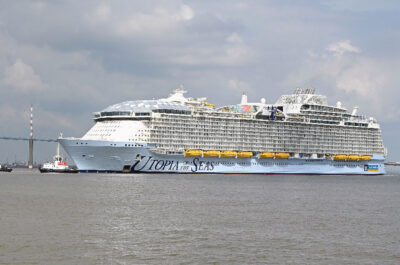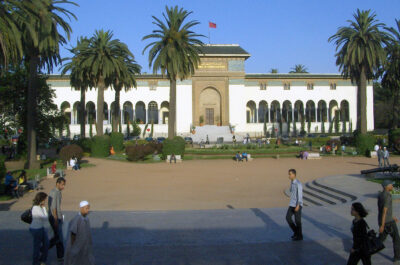As the final stretch of the XXVIII Olympiad approaches, Jones Lang LaSalle Hotels examines the lasting impact of the Games on Athens and whether the billions of dollars have been well spent…
As the final stretch of the XXVIII Olympiad approaches, Jones Lang LaSalle Hotels examines the lasting impact of the Games on Athens and whether the billions of dollars have been well spent. According to the company`s research, the effect on host cities is felt long after the final gold medals are awarded. The firm analyzed the legacies of four recent Olympic hosts – Seoul (1988), Barcelona (1992), Atlanta (1996) and Sydney (2000), and the anticipated impact on Athens (2004).
History clearly demonstrates that the 2004 Olympic host city will enjoy significant long-term benefits, said Melinda McKay, senior vice president, Jones Lang LaSalle Hotels. While the Games generate short-term economic gains, such as more jobs and increased revenue, the real gold is in the long term changes to the urban fabric of the city. With the goal of reinventing itself as a modern city for the third Millennia, Athens has focused on just such a transformation. Its opportunity lies in what Jones Lang LaSalle Hotels identifies as the Olympics` five key legacies:
1. Urban Regeneration
Using the Olympics to revitalize run-down urban areas is a theme common to the last four Olympic host cities, said McKay. Seoul did it with the Chamsil area, Barcelona with its seafront, Atlanta with its inner city and Sydney transformed an unusable swamp to one of the largest and best-serviced new residential communities in the city. Athens has embarked on a similar path, rehabilitating 2,700 acres of neglected land (an area more than three times the size of New York`s Central Park), creating inner city parks to provide much needed open `breathing` space, and unifying the city`s archeological sites into a single `park.` This means that the full benefit of the Games will be realized well after the flame is extinguished, said Ms. McKay.
2. Olympic Villages
The design, location and form of Olympic Villages can also have a dramatic impact on the urban development of the host city, said Ms. McKay. Athens has learned from past Olympic hosts, like Seoul and Barcelona, and will convert its Olympic Village into new full-scale urban centers. They will transform the 200-acre Olympic site into residential, commercial and public uses after the Games. This village will serve as a guide as Athens tries to put the reigns on its rampant urban sprawl.
3. Infrastructure Improvements
Athens has one of the most ambitious infrastructure development programs associated with an Olympics Game. It boasts numerous new sporting facilities, the centerpiece of which is the Olympic Stadium, designed by world-renowned Spanish architect Santiago Calatrava. In a city where the most famous building is 2,400 years old, the new stadium is useful shorthand for modernization, and will serve as a beneficial anchor to its global repositioning efforts, said McKay.
In past host cities, as well as Athens, many of the proposed infrastructure improvements had been discussed for years, but the Olympics often provided the necessary catalyst to bring projects to fruition. Fortunately, the most recent host cities learned from costly mistakes of earlier hosts, minimizing investment in temporary facilities and maximizing investment in long-term projects, said McKay. Transportation is the centerpiece of Athens` bold infrastructure program – it has gone from suffering the worst airport in Europe to one of the best. In addition, the new trains, trams and ring roads are designed to drastically cut down congestion, smog and noise pollution.
4. Greening the Games
Environment is becoming increasingly important, particularly in the selection phase for the Olympic Games. One of Beijing`s (2008 host) touted goals is to have cleaner air than Paris by 2008, in an attempt to address the significant environmental concerns for the city. Greenpeace labeled the Athens Olympics the Brown Olympics a reflection of the city previously being one of the most polluted in the EU. While transportation developments will do much to alleviate pollution and congestion, it appears that environmental standards have fallen short of the Sydney benchmark. Sydney scored points for its enviro-friendly infrastructure which included the Olympic Village, a landmark in solar power usage, as well as public transportation achievements. 2012 contenders should take note.
5. Tourism Promotion and the Convention Sector
The Olympics transforms a city into a living postcard. There is no bigger marketing event on this planet, with around 85% of the world`s four billion people tuning in at some point during the Games. For a host city`s tourism and convention
industries, the long-term payback of the Olympics is profound, said McKay. The 2000 Olympics has been widely recognized as the best example of how to leverage the Olympics for the benefit of the tourism industry. An estimated US$2 billion of global publicity for Sydney and Australia was generated during 1997-2000.
The tourism effort in Athens has not been as well coordinated. A dedicated Tourism Minister was only just appointed for the first time earlier this year. It has little in the way of new international standard hotels, with a building moratorium only lifted in December 2000 (although 90% of the existing stock has been renovated). Service levels remain below international standards and the city has, until the Games, suffered from bad publicity caused by air pollution and traffic congestion. The Olympics has the opportunity to transform this image.
Tremendous potential exists to position the city on the short-break circuit, with a massive population pool sitting at its doorstep. Athens has already made some progress, with the introduction of direct EasyJet flights and a plethora of short-break deals.
The Olympics are widely recognized as a strong growth driver for a city`s convention market, but Athens will have to wait: it remains one of the few capital cities that do not have a dedicated convention center (one is being slated for delivery by 2006). This is an opportunity missed. Sydney, Atlanta and Barcelona all experienced a spike in convention delegates in the year after the Games and Sydney`s convention bid win increased by 34 percent following the 1993 announcement it would host the Games. The growth in facilities and exposure has long-term payback benefits, noted McKay. Barcelona has achieved a 21% per annum compound growth in international convention delegates between 1992-1997. The lift in exposure and demonstrated ability to host major world-class events will benefit Athens in the long run.
Beyond the Olympics
Some cities have been more successful than others in leveraging the catalyst provided by the Olympics to gain significant long-term benefits, said Ms. McKay. The degree to which cities are able to achieve this will depend on a number of different factors. These include:
- Competitiveness of the business environment – affects the
ability to attract corporate occupiers; - Quality of the tourism attractions – determines the degree of
long term tourism benefits; - Ability to sell the Olympic experience to attract other major
world events – extends to the re-use of facilities and the leveraging of
organizational experience; - Level of tourism infrastructure built for the Olympics – which
has major long-term implications; - Ongoing promotional campaign – critical in translating
short-term interest into long-term benefits.
The Olympics provides Athens with a once-in-a-century chance to transform itself into a great European capital. Barcelona was incredibly successful at doing this and it didn`t even have Zeus in its backyard.
Theodore is the Co-Founder and Managing Editor of TravelDailyNews Media Network; his responsibilities include business development and planning for TravelDailyNews long-term opportunities.






















































































































































































